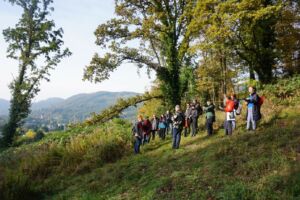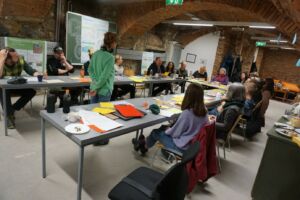Location: Graz, Austria
Lead partners: IFZ, FUG
Involved partners:
The inclusive, biodiverse edible city of Graz
Graz is rich in different initiatives for alternative urban food production such as community gardens, food co-ops or sharing initiatives. However, these are often limited to well-educated socially advantaged groups.
Together with several local actors (citizens, CSOs, municipality departments) this case establishes a biodiverse, edible green space for and with women who currently do not have access (because of financial, social, language or other barriers) to an urban garden. This space will be held as a Living Lab – so that learnings and co-created knowledge in this real-life environment can be fed back iteratively, improving sustainability and increasing impact. This intersectional approach to a Living Lab in the field of biodiverse, urban food production is highly innovative.

Connect with nature
Parallel to the participatory garden planning and knowledge co-creation with the engaged women and an evaluation of the Living Lab, a second participatory multi-actor process – on a policy level – will systematise and upscale the experiences, to contribute to an “Inclusive Biodiverse Edible City” strategy for Graz.

Co-creative workshop in Graz
The Graz case seeks to:
- co-create a biodiverse, edible garden in a living lab with women* of various age groups, ethnicities, caring responsibilities with lower incomes,
- evaluate the Living Lab, and research the integration of intersectionality in biodiversity knowledge production,
- upscale the systemised experiences of the Living Lab to support the efforts of city policy stakeholders towards participatory designs for inclusive biodiversity and food policies,
- raise awareness and communicate about intersectionality, biodiversity and food justice by showcasing the biodiverse edible garden.

The cradle of biodiversity
Publications
Transformation through cooperation
First Outcomes from the PLANET4B project on biodiversity
Erste Ergebnisse des PLANET4B-Projekts zur biologischen Vielfalt
